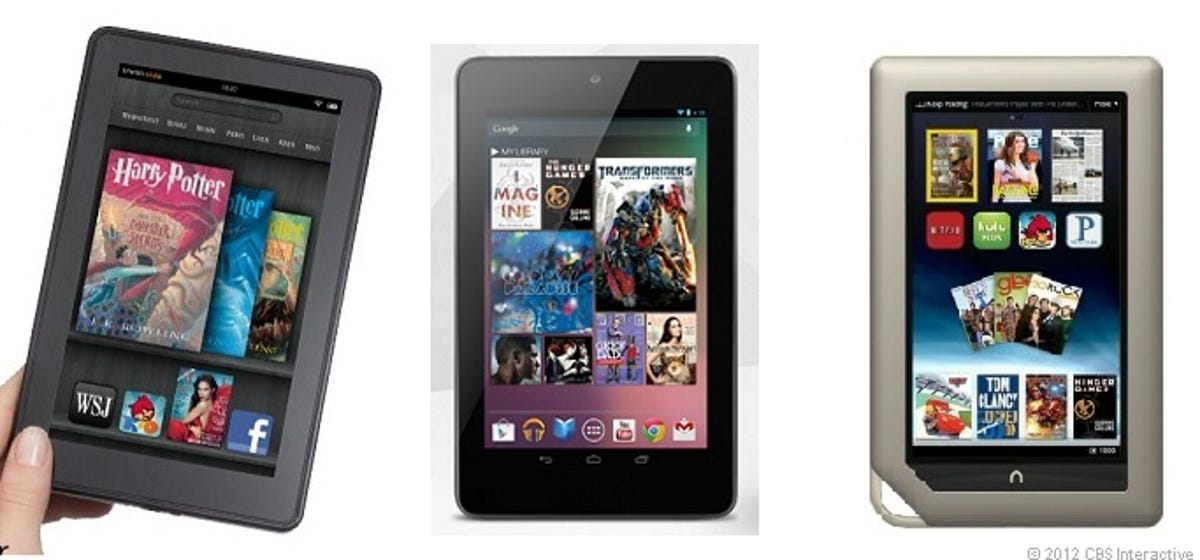In October 2010, Steve Jobs explained in detail why a 7-inch iPad, or iPad Mini, wasn’t in Apple’s future.
“Apple has done extensive user testing and we really understand this stuff…There are clear limits on how close you can place things on a touchscreen, which is why we think 10 inch is the minimum screen size to create great tablet apps,” he said. “One naturally thinks that a 7-inch screen would offer 70 percent of the benefits of a 10-inch screen…this is far from the truth. Seven-inch screens are 45 percent as large as an iPad. This size isn’t sufficient for making great tablet apps.”
Jobs would likely have stood by his negative view of the 7-inch tablet in checking out the Nexus 7 introduced at the Google I/O event Wednesday. It may be a popular and lower-cost form factor, but it’s a significant compromise. It’s like going from a 40-inch TV screen to a 27-inch screen for watching movies. It lightweight and works, but it’s not the ideal user experience. At 1280 by 800 pixels, the Nexus 7’s screen is sharp, but not when compared to the 2048 by 1536 resolution of the iPad’s 9.7-inch Retina display. And, of course, Jobs would say that Android is basically an inferior rip-off of Apple’s iOS.
But in the “you get what you pay for” category, the 7-inch, $199 to $249 price point is an attractive option for the masses seeking tabletness, especially for consuming e-books, magazines and other media. And for Google, the Nexus 7 provides a vehicle to bring new customers into the Google Play store, just as Amazon and Apple drive their tablet users into their stores to gain credit cards and increased profit margins.


David Carnoy/CNET
The Nexus 7 joins a parade of Android tablets trying to gain a foothold in the mini-tablet space, including Amazon, Barnes & Noble Nook, Asus, Samsung, Sony, Toshiba, and Lenovo. So far, the Androids are mostly competing with each other rather than the iPad.
“One thing Apple has done very well with each iteration of the iPad, not only with hardware and software but also marketing, is position it as not just a consumption device but also a production device. That’s one of the hangups with 7-inch tablets and also with the Kindle and Barnes & Noble’s Nook,” said Tom Mainelli, IDC’s research director of Mobile Connected Devices, in a report just ahead of the Nexus 7’s unveiling.
Related stories
- Google talks Chrome for Android, iOS
- Brin: Google Glass lands for consumers in 2014
- Google Nexus tablet poses no threat to iPad, says analyst
- Nexus 7 tablet guidebook now available
- Google Docs gets offline mode
- Photos: Day 2 of Google I/O
- Complete coverage: Google I/O 2012
Apple has long been rumored to be developing a 7-inch version of the iPad (CNET’s Josh Lowensohn provides a list of the rumors over the last three years). But, Apple may not want to confuse the market as the long expected, larger screen iPhone 5 rolls out later this year. And, it’s unclear whether Apple wants to play in the 7-inch space, given Jobs’ stated objections in 2010. Apple’s braintrust could certainly change its mind and decide to sell a device that competes in the 7-inch range, but it will depend on how it impacts the entire family of iPhone and iPad devices.
Mainelli believes that Apple could increase its market dominance with a iPad mini. “If Apple launches a sub-$300, 7-inch product into the market later this year as rumored, we expect the company’s grip on this market to become even stronger,” he stated.
The cheapest iPad retails for $399, a long way from the $199 Nexus 7 or Kindle Fire pricing. Amazon and Google are both selling their 7-inch tablets at a loss. Google is selling the Nexus 7 at cost and also footing the bill for marketing the device to create a market.
It’s not the Apple way to offer an unsubsidized iPad at no margin. Apple likely has margins of over 50 percent on each iPad sold, and according to Mainelli, Apple’s tablet business will continue to grow this year no matter what the Android competition does. He projects that Apple’s share of the tablet market this year will make up 62.5 percent of global shipments this year, up from 58.2 percent in 2011. Android-based tablets are projected to decline to 36.5 percent, from 38.7 percent last year.
So will Apple produce a the 7-inch iPad? With the iPhone 5 in the wings and a flimsy business rationale, the iPad mini is unlikely to surface anytime soon.


Now playing:
Watch this:
Nexus 7 aims its sights at Kindle Fire
2:35



